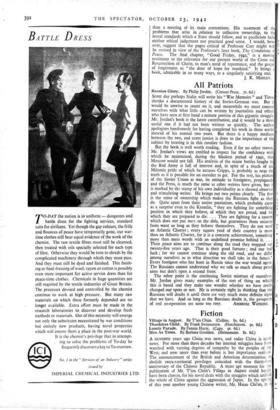The Making of the Future
Christianity and Civilisation. By H. G. Wood, Professor of Theology in the University of Birmingham. '(Cambridge University Press. 3s. 6d.)
Au. that we mean by civilisation has developed in the past against a background of belief in the reality of ethical and religious values and sanctions. The discounting of Justice, Mercy and Truth in Nazism, and anyhow, to some extent, as Professor Wood feels bound to affirm, in Russian Communism, shows the gulf which has opened between what was held sacred in theory and what has come to be the working creed of those who repudiate both the classical- and the Christian outlooks, the humanitarianism of Greece, and its deepening in Palestin't, where men learnt to speak of " the philanthropy of God." Christians very naturally think of the present conflict as one in which Nazism threatens the whole Christian philosophy of life. They look forward to a victory that will lead on to an extended realisation of the world's need of Christianity. But that is not the future which all who agree in abhorring Nazism desire. Exponents of the " scientific attitude," such as Professors Waddington and Huxley, followers of Lenin and Marx, who accept their theses as to the course of history, their diagnosis of humanity's ills, and their prescriptions for the remedying of the same, have very different hopes for the future. They do not think of man as a being re- sponsible to God, for the use of the freedom with which he is endowed, and the inheritor of a destiny that passes beyond the limits of the present world. Beliefs, ideals, tests sanctions, are all different from those the Christian would affirn; or apply.
It is with this theme that rrofessor Wood is concerned, and his task is a double one. Before he can pass to the objectives which await a constructive .Christianity in the social and international orders, he needs to examine the doctrines involved in, and the claims made on behalf of, scientific humanism and Marxism. To this he devotes the two chapters which follow the opening account of the debt that civilisation owes to Hellenism and to Christianity. In his criticism, which loses nothing of its acuteness through the urbane manner in which it is expressed, and the humorous touches in which he is an adept, he is never blind to whatever there -is of truth in the positions which he discusses. He is, for instance, not content with the distinction that science is concerned simply with the answer to the question " How? " and not with the more ultimate question " Why? " Rather is it true that " the study of means will often yield a clue to ends, and if there are such things as cosmic purposes, the study of the Aifferent ways in which things are done should help to throw light on such purposes." What he does challenge is the view that knowledge of the nature of reality can be attained only by the methods associated with empirical science. Again, he holds that the Marxists are right in laying stress upon the economic factors in historical developments, but demonstrably wrong in interpreting all histedical conflicts as so many phases in the class struggle. When he comes to his exposition of the nature of the Christian commonwealth, of its economic and international consequences, Professor Wood breaks away from those influential Christian thinkers who view the Kingdom of God simply in its future, other-worldly aspect. He could not overburden his book with a discussion of this issue • yet I think it unfortunate, to say the least, that his dismissal of "the eschatological school" should suggest a by-passing rather than a meeting of its main contentions. His treatment of the problems that arise in .relation to collective ownership, to the moral standards which a State should follow, and to pacificism lacks neither ethical judgement nor practical good sense. I would, how. over, suggest that the pages critical of Professor Carr might well be revised in view of the Professor's later book, The Conditions of Peace. The final chapter, "Good Friday, 1942," is a moving testimony to the relevance for our present world of the Cross and Resurrection of Christ, to man's need of repentance, and the gospel of forgiveness as " the door of hope for mankind." It brings a book, admirable in so many ways, to a singularly satisfying end.
J. K. MOZLEY.



























 Previous page
Previous page